Health officials urge university students to follow safe sex practices
STI cases are at an all-time high, with Cambridge having the highest rates of gonorrhoea in East Anglia

The UK government and a variety of health providers have reiterated their message to university students to safeguard against a rise in STI diagnoses. Students should wear condoms and access regular sexual health testing.
Gonorrhoea diagnoses are at their highest numbers since records began, and syphilis cases are at the highest levels since 1948.
Cambridge has the highest rates of gonorrhoea diagnoses within Cambridgeshire. One in 593 people in Cambridge catch gonorrhoea, compared to one in 2,416 in East Cambridgeshire.
This is also much higher than the national average, with data showing that 169 people per 100,000 in Cambridge catch the infection, compared to 149 per 100,000 nationally.
The government is warning that young people are “especially at risk” of developing an STI. Data published by the UK Health Security Agency showed that, among people aged 15-24, there were 104,107 cases of Chlamydia, 29,880 cases of gonorrhoea, and 4,617 cases of genital warts in 2023.
In response to this, sexual health clinics have reiterated their message to incoming and returning students to use condoms when engaging in sexual activity, and to access STI screenings.
Laura Domegan, head of nursing at Brook Sexual Health Clinic, said: “Freshers is always a good time for young people to consider their sexual health,” and that it is “particularly important” this year.
Katy Sinka, the UKHSA head of STIs also explained that “with higher STI rates in young people, having sex without a condom can increase your chances of an infection like chlamydia or gonorrhoea.”
Data shows that there has been an increase in the rate of diagnoses of syphilis from 2022 among young people, with 1,040 new cases in 2023, compared to 1,000 in 2022.
Many Cambridge colleges provide free condoms to students, as does the Cambridge University Student’s Union, which provides around 40,000 sexual health supplies to students each year.
However, there have been reports of delays and shortages at the SU, with JCR Welfare Officers having to use their own budgets to pay for sexual health supplies.
Alongside the SU, initiatives such as the C-Card scheme also provide sexual health supplies, including delivering condoms by post.
Free STI screening is available at the Lime Tree Clinic on Mill Road, or through free and confidential self-test kits which are delivered in discreet packaging and sent back through the post. Other organisations also provide testing services, such as DontPassItOn, while GP surgeries can also carry out some STI tests.
 News / SU reluctantly registers controversial women’s soc18 December 2025
News / SU reluctantly registers controversial women’s soc18 December 2025 Features / Should I stay or should I go? Cambridge students and alumni reflect on how their memories stay with them15 December 2025
Features / Should I stay or should I go? Cambridge students and alumni reflect on how their memories stay with them15 December 2025 News / Dons warn PM about Vet School closure16 December 2025
News / Dons warn PM about Vet School closure16 December 2025 News / Cambridge study finds students learn better with notes than AI13 December 2025
News / Cambridge study finds students learn better with notes than AI13 December 2025 News / Uni registers controversial new women’s society28 November 2025
News / Uni registers controversial new women’s society28 November 2025










